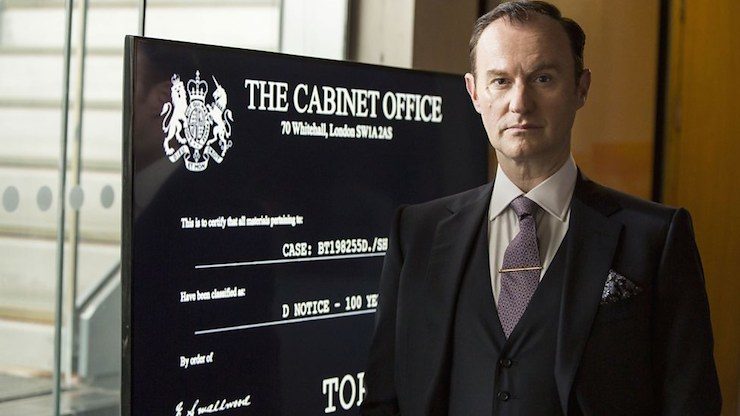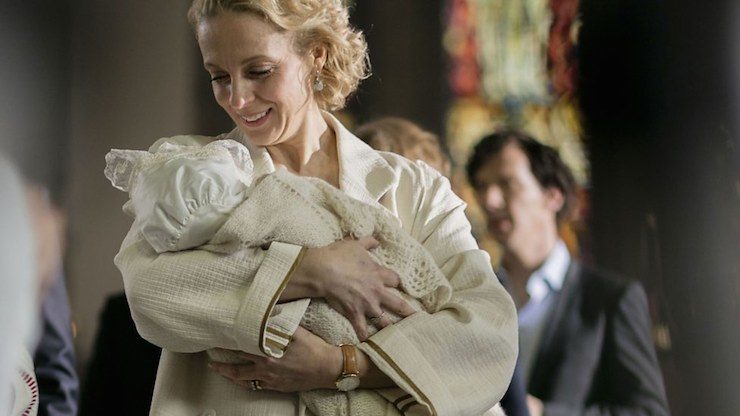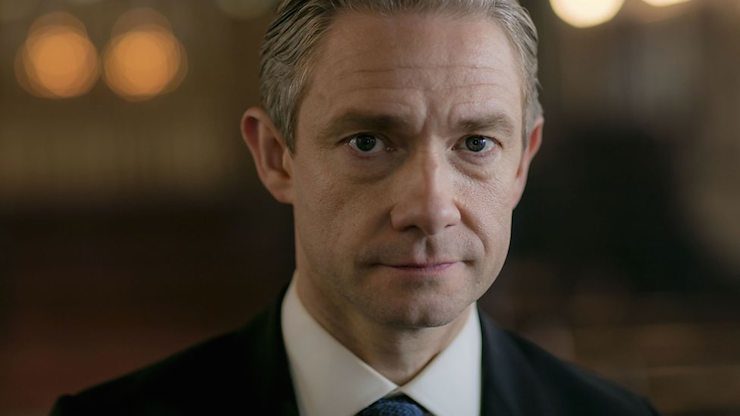After last year’s Sherlock Christmas special, “The Abominable Bride,” it seemed particularly cruel that we would have to wait another entire year for a full season of Sherlock. Now the gang’s all back, and we get our first crack at a new story with “The Six Thatchers.”
Spoilers for Sherlock 4×01 “The Six Thatchers.”
Summary
Sherlock is off the hook for Magnussen’s murder following some video doctoring. He’s going to wait for Moriarty’s plan to show itself, and in the meantime he gets back to work. John and Mary’s baby arrives, a little girl named Rosamund. (Rosie for short.) Sherlock, Molly, and Mrs. Hudson are named godparents. He gets a case from Lestrade that happens to coincide with a smashed bust of Margaret Thatcher. More of these busts are being smashed, so Sherlock looks up the make and who owns the rest of them, then confronts the person breaking the busts—it turns out to be a man named Ajay who is searching for his own memory stick, just like the one that Mary gave to John in “His Last Vow”–the one that John destroyed. Ajay was also a member of “A.G.R.A.,” four individuals who functioned as a freelance assassin unit. He insists that Mary betrayed him six years ago, during a mission in Tbilisi, Georgia, and tells Sherlock that he plans to kill her.

Sherlock confronts Mary about the business, and while he reminds her of his vow to protect her, she decides to drug him and go on the run. Sherlock tracks her down because John had the idea to place a tracker on Ajay’s A.G.R.A. memory stick. Ajay follows Sherlock to the same location, intent on killing Mary, who insists that she never betrayed him. Ajay is shot by police, but he does tell them that the people who had him under lock and key for the past six years said they were betrayed by “The English Woman.” The code word they had received before their op was “Ammo,” which Sherlock realizes is a reference to the Latin “I Love.” Lady Smallwood was responsible for running freelance operations under that name, so he advises Mycroft to bring her in. She insists that she did not betray the A.G.R.A. group to terrorists and get them captured.
John confronts Mary about all the lies in their relationship, saying that they come from both sides. It’s revealed that John has been having an affair with a woman he met on a public bus, and that he has since tried to break it off.
Sherlock finally figures out that that the person who betrayed the group is the secretary and aide to Lady Smallwood and the others in her government group: Vivienne Norbury. The two meet at the London Aquarium, and Sherlock calls Mary and John to come along too, though Mary arrives first. Norbury had been selling state secrets, but the Georgian British ambassador found out and was going to expose her. The ambassador was kidnapped by terrorists, but then A.G.R.A. was deployed to save him, so she gave both sides information to get the whole lot killed. John, Mycroft, and Lestrade show up and try to convince her to come quietly, but Sherlock needles her, saying that she did all of this out of jealousy because she knew she was better than her peers and resented having to be their secretary. Goading that she finally met her match because of him, he succeeds in pushing Norbury hard enough that she decides to shoot him—but Mary steps in front of the bullet.
She dies quickly in John’s arms, telling Sherlock that she reckons they’re even from the time that she shot him, and that she loves John and being Mary Watson was the best version of her life. John is furious with Sherlock for breaking his vow to protect them from harm. He refuses to see Sherlock after that, and Sherlock ends up going to John’s old therapist. Later on, Sherlock gets a piece of mail from Mary with a video that contains instructions for him on the event of her death: She wants him to take his hardest case ever, to save John Watson. Mycroft puts in a call to “Sherrinford.”
Commentary
So… Mary’s gone.
There’s a lot of awkwardness about how this episode went down, and it’s really hard to get around no matter how you slice it up. First off, it was always likely that Mary was going to die; Mary does die in the Doyle stories, and there’s very little of her in the canon to work from. Second, it was made public just two weeks ago that Martin Freeman and Amanda Abbington (who are playing John and Mary if you’re not up on that side of things) split after fifteen years of partnership, which might have contributed to deciding to get rid of the character faster? We’ll probably never know.

But the choice to kill off Mary at this specific point in time is, simply put, poorly conceived. And that’s for one simple reason: Everything about her death is specifically placed to saddle John and Sherlock with the maximum amount of guilt so that this season can be more fraught than the last. It’s all about how they’re going to feel about Mary dying, and it’s not even well-executed to lessen the pain of how unnecessary it is. If they had decided to kill Mary in the previous season, then it would be a more obvious move to mirror canon. If they had kept her around for a long while, then she could have been part of the show’s dynamic and helped to freshen things up around Baker Street. Instead, we have a weird fake-out last season where Sherlock nearly gives up his life to keep her secrets safe, commits murder to that end, and then… she dies anyway? Just so John can be angry at him for “breaking his vow”?
Okay fine, the real point is that John is redirecting his anger at himself toward Sherlock because he was an assh*le who cheated on his wife. And while we can rage collectively over the choice, there’s precedent for John “Ladies Man” Watson throughout the old Holmes stories (though he’s never made out to be a philanderer). But then we have to ask the obvious question: Why does John cheat on Mary? Is he still angry that she lied to him about her past? Are they having normal domestic troubles that he can’t get past? Is he feeling a little vindictive now that Sherlock wants Mary to help him consult on cases? Is he just being a big ol’ jerk? Any of these possibilities could prove true, and perhaps the show will actually go about answering that question later on. But since they don’t answer it in this episode, the cheating reads as a plot device to make certain that John is going to be even more distraught over the death of his wife—particularly after she tells him that “being Mary Watson was the best possible life” for her.
By the way, that was easily one of the most hamfisted lines of television I’ve ever heard. It’s fine that Mary gave up her super-spy life to have something semi-normal and calm with a family and a regular job. It’s not hard to believe that someone might want that after a life of black ops murdery-ness. But telling John that being his wife and taking his name was the absolute best possible achievement for her? You can practically hear the Angst Fairies rubbing their hands together ominously and cackling about how much more guilty John Watson is gonna feel now. There were classier ways to do this. She could have even echoed his own words from last season back at him, something like “My past was my problem; loving you was my privilege.” Literally anything but a perfectly competent, sharp, witty woman telling her cheating husband that being his wife was her greatest life accomplishment.

Another question: Why did she jump in front of Sherlock and take that bullet? Sure, she loves the guy, he’s her husband’s best friend and he loves her too. But what was the instinct there? Mary’s got her heroic qualities, but there’s never been any indication that she’s big on sacrifice. Is it because her old pal Ajay just died in front of her? Is she even really broken up about Ajay? I don’t know because the episode is completely centered around John and Sherlock’s emotions. We don’t get to find out why Mary does things, even though the things that Mary does are really cool and interesting. She’s there to prop up the the center duo, now at the expense of her own life. And it’s really too bad that the A.G.R.A. stuff couldn’t have been left a mystery; the answers to those questions are rarely as exciting as not knowing.
There’s still plenty to enjoy in this episode—solving crimes from chairs and cabs, Sherlock hashtagging everything, John replacing himself with a balloon, the perpetual confusion over Inspector Lestrade’s first name. (Poor Greg.) Sherlock’s development itself is very well done, as we watch him learn how to be more conventionally available to others. His attempt to involve Mycroft in that same process is a gift all by itself—if we need any proof at all that Sherlock Holmes has grown, his attempt to share Rosie’s baby pictures with his older brother without even a hint of shame is really all we need. The places where he continues to fall down, though, are ultimately what costs Mary her life. If Sherlock had had enough humility not to antagonize Vivienne Norbury, she would have never tried to shoot him in the first place. It’s an important lesson for him to learn, but a really unfortunate way for him to learn it.
John Watson is another matter. It seems as though the show is trying to reconfigure around John, who has been largely shuffled over in favor of Sherlock’s character journey these past two seasons or so. But is this really the story we need to make him interesting again? All we get is an awkward affair that plays out as one of the episode’s primary twists, and another reason for him to be furious at his best friend when we saw plenty of that after Sherlock came back from the dead. If John is going to go through his own transformation, it would have been nice for him to do it without the benefit of so many clichés and retread material.

We’ve got two more episodes to make sense of this arc. Perhaps “The Lying Detective” will give us more to chew on, but it’s still unfortunate that Mary’s story had to end this way. When all is said and done, I would have been happier with her just running off into a sunset somewhere, deciding that this life wasn’t for her after all. Not murdered due to Sherlock Holmes’s stupidity, and posthumously asking him to “save” her rage-filled husband.
Shoutouts and Unsolved Sundry
- Sherlock’s childhood dog Redbeard is back, and continues to be prominent. It’s possible that he will be more important to the ongoing plot than previously thought, particularly as he appeared in the dream that Sherlock had and claimed was recurring.
- Mycroft calls in Sherrinford at the end of the episode, the potential third Holmes brother. Sherrinford was one of the names Doyle considered for Sherlock when he started, and the name was later pegged for a possible third Holmes siblings by fans when it was noted that there was likely another brother who would have taken on the family estate and title (Squire) that Mycroft and Sherlock clearly had no interest in. Looks like we’re finally going to meet him? (I still want it to be Ben Whishaw’s Q from the current James Bond run. It’s the only thing that makes sense.) There’s also a note on Mycroft’s fridge that says “13th.”
- As usual, there are a multitude of references to other Holmesian stories, but the title is reference to the tale “The Adventure of the Six Napoleons.” The breaking of the busts and the preoccupation with the black pearl of the Borgias all come from that story, and are cleverly used as a red herring in this version.
- Toby! Toby is the dog who assists Holmes in several stories, first introduced in “The Sign of Four.” He is also prominently featured in the animated Disney version, The Great Mouse Detective, which is the #1 reason why I associate him with goodness and was super excited to see him.
- Okay, what are the chances that the woman John is having an affair with is part of someone else’s plot, Moriarty or otherwise? Because the affair is weird, and this is a tactic that people have pulled on John before—both Mycroft and Irene Adler have used pretty women to get John’s attention. It just seems too obvious to dismiss out of hand.
Emmet Asher-Perrin would watch an episode of just Sherlock and Toby, though. You can bug her on Twitter and Tumblr, and read more of her work here and elsewhere.










